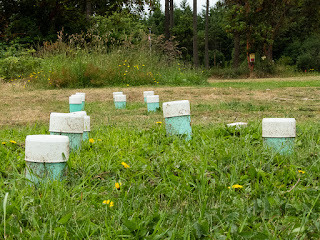GLIMMERS OF HOPE
FOR THE HADLOCK SEWER
Large
Federal Infrastructure Bills Could Provide Funding
By
Jim Scarantino
Local and state
governments have been unable to pay for the critically needed Port Hadlock-Irondale
sewer project. At least another $30 million
must come from somewhere. It could come
from Washington, D.C.
A trillion-dollar
infrastructure fund for projects in poor rural and urban areas was introduced this
month by a diverse, bi-partisan group of lawmakers.
Introduced
by Reps. Mike Kelly, R-Pa., William Lacy Clay Jr., D-Mo., and Ted Budd, R-N.C.,
the Generating American Income and Infrastructure Act would require the
Agriculture Department to sell distressed assets and the
Treasury to use the proceeds to fund infrastructure projects in poor
communities.
Kelly
is a member of the Republican Study Committee.
Clay belongs to the Congressional Black Caucus. Budd belongs to the
Republican Freedom Caucus.
The bill comes at
a time when the Trump Administration and Senate Democrats are pushing their own infrastructure proposals.
The GAIN
Act would generate an estimated $2 trillion.
Half would go towards paying down the national debt. The other half would go to projects in
predominantly poor Black, Hispanic and rural white communities. By selling troubled assets, the act also
keeps the government from losing more money on sinking investments.
Poor Rural
Communities
Irondale and Port
Hadlock are poor communities. Their
income and wealth levels are far below those of the rest of the county, the
state and the nation. Their poverty rate
at times has been significantly higher than the nation’s. Many people in Port Townsend’s affluent
neighborhoods have little idea of the poverty they would encounter if
they left S.R. 19 and wandered through the Irondale’s hidden lanes.
The area has lost
businesses and jobs because of the lack of a sewer. Current businesses are constrained by the
limitations of septic systems. Growth plans have been shelved. Other businesses have been required by the
county government to limit hours of operation and restrict their operations to
fit limited septic capacity.
Yet this is
supposed to be an urban growth area, according to the county’s comprehensive
plan. This is also the area with the
greatest prospect of supporting affordable housing, due to land availability
and relatively lower costs. According to
four-term county commissioner David Sullivan, the Hadlock-Irondale sewer
project is the key to the affordable housing situation county-wide.
Commissioner Sullivan
is not alone in his assessment of the critical importance of a simple
wastewater treatment project.
“The Irondale-Hadlock
sewer is essential to the local economy and making housing more affordable,”
U.S. Representative Derek Kilmer told the PT Free Press.
Not Enough Money
to Build
At the cost of a
million dollars, the sewer has been engineered.
The county has obtained the land.
The county has deemed the project "shovel ready."


If only there were
enough money.
The current
projected cost—pending a possible re-engineering—is about $45 million. The county reports it has secured $13.4
million and is counting on state and federal sources for the balance.
We asked our
Congressional delegation what they have been doing to secure federal funding
for the critically needed sewer project and where they stood on the GAIN Act.
Representative
Kilmer
“I’ve been working every funding angle to help
get the project the funds it needs so businesses can start growing,” Kilmer
told PT Free Press. “I’ve connected the county commissioners with state and
federal advisors and resources who have helped navigate the over-complicated
government funding process. As Vice Ranking Member of the Appropriations
Committee, I’ve pushed to increase USDA Rural Wastewater Treatment grants over
the last several years so that this project, and a project with a similar
challenge in Kitsap County can secure more federal funds.”
As for the GAIN Act, he said, “I’m encouraged by any bipartisan bill that would direct new federal funds to rural infrastructure projects. I’m taking a close look at this bill to determine how much revenue it could generate, and whether communities in our region could use that revenue.”
“On a broader level,” he added, “this
challenge exemplifies the need for Congress to pass a comprehensive
infrastructure package. The leaders of our country can’t drag their feet
anymore on infrastructure investment because it’s hurting the economy in our
neck of the woods. I’ve used my seat as Vice Chair for Policy of the New
Democrat Coalition to develop a policy agenda that would help projects like
this one start moving. I’m working with members of both parties to invest in
our communities and help bring the infrastructure we need to grow our economy.”
Senator Maria Cantwell
Bryan Watt, a spokesperson for Senator
Cantwell had this to say:
“On the Irondale-Hadlock sewer infrastructure
project Senator Cantwell’s outreach team has meet with Jefferson County folks
about helping get this project done and identifying a potential funding stream.
“Earlier this year Senator Cantwell and
several of her colleagues introduced a major infrastructure
plan that invests billions to modernize airports
and waterways, sewer systems, invest in affordable housing, rebuild crumbling
schools and VA hospitals, overhaul road and bridge repairs, equip rural
communities with high-speed internet, revitalize main streets across the
country, modernize the electric grid and energy infrastructure, and more.
“Specifically, the bill includes $23 billion
dollars for water infrastructure through the U.S. Department of Agriculture
(USDA). Rural Development Water and Waste Water Grant Program, which provides
funding for such projects in small towns and rural communities under 10,000 in
population.”
Senator Cantwell’s legislation relies on
repeal of tax cuts passed by Congress and strongly supported by President
Trump.
Senator Patty Murray
“There’s no doubt,” Senator Murray
told Port Townsend Free Press, “our country needs to do more to address our
aging infrastructure, which is why I have pushed for significant infrastructure
investments over the years and even created a program that allows communities
to apply for competitive grants to get big projects across the finish line. I
stand ready to help communities across our state including Port Hadlock because
improving and maintaining infrastructure is so important to the health and
safety of families, as well as to local economies.”
Jefferson County Cannot Afford Another Miss
The Obama administration poured a trillion
dollars into the economy to counteract its inherited recession. It is not too long ago to remember President Obama touting "shovel ready" projects across the country that would be completed thanks to his stimulus package. A major focus of that stimulus was
infrastructure investment. Despite
having a friendly Democrat administration and a Democrat-controlled Congress,
our delegation, and our local leaders, for whatever reason, did not seize the
opportunity and secure funding for the Hadlock wastewater system. Grants of hundreds of millions of
dollars were dished out. Years later many
have been forgotten with little or nothing to show. Huge losses were deemed acceptable because
the government’s first goal was stimulus. A $30-40 million grant for a sewer
system in a poor community needing jobs and housing—it should have been a gimme.
Mr. Kilmer was not yet in the House. He now may have a chance to seize an
opportunity that slipped by before. He
can be one of those Congressional heroes remembered for generations because of his tangible legacy. The “Derek
Kilmer Sewer Plant” could be a terrific monument to public service that really
made a difference.
The GAIN Act presents a possible second great
stimulus opportunity that cannot be missed. As Rep. Kilmer noted, we should be encouraged by its bi-partisan backing.
Our delegation could do nothing more important
for Jefferson County than to secure the funding that would launch the Tri-Area
into an era of prosperity. Maybe they
can give Trump something he wants to get something we need back home.
President Trump has already derided Democrats’
plans for rolling back his tax cuts. The
infrastructure bill backed by Senator Cantwell is likely going nowhere. She needs to change her thinking.
Similarly, President Trump’s infrastructure plan, which relies mostly on increasing gas tax and ramping up state and local
investment, faces its own hurdles, including from within his own party.
The GAIN Act has the advantage of paying for itself and at the same time shielding the government from losing more money on
bad assets. It appeals to conservatives in
paying down the debt while building infrastructure to support economic
growth. It appeals to Democrats because
it targets Black and Hispanic communities and also poor white communities,
where Democrats are struggling to hang on.
For the sake of our community, our
congressional delegation must build bridges to the Trump
administration. Far more important to
our community than the ideological battles waged inside the
Beltway is an unsexy, mundane investment in pipes and pumps in Jefferson County's blue collar communities.
Voters have relied on
intermediaries to press our state and congressional representatives to secure
funding for the sewer. This issue is so
important we need to communicate with them directly.
Here is contact information for our Congress folks. Let them
hear from you directly. Encourage
them. Write a letter. Don’t use email—it is too
easily ignored. Give them a call. Or better yet, fax them. Old fashioned faxes get attention:
Rep. Derek Kilmer
1520 Longworth House Office BuildingWashington, D.C. 20515
(202) 225-5916
F: (202) 226-3575
Senator Patty Murray
154 Russell Senate Office BuildingWashington, D.C. 20510
(202) 224-2621
Toll Free: (202) 866-481-9186
Fax: (202) 224-0238
Senator Maria Cantwell
511 Hart Senate Office Building
Washington, D.C. 20510511 Hart Senate Office Building
(202) 224-3441
Fax: (202) 228-0514
..




Comments
Post a Comment